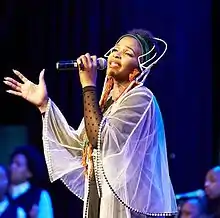Simphiwe Dana
Simphiwe Dana (born 23 January 1980 in Gcuwa) is a Xhosa singer and songwriter in South Africa.[1] Due to her unique combination of Jazz, Afro-soul, Rap and Traditional music, she has been hailed as the "new Miriam Makeba".[2] Dana is also known for her creative social commentary and activism through music as a political art form.
Simphiwe Dana | |
|---|---|
 Simphiwe Dana performing Live at "Theatre on the Track" | |
| Background information | |
| Birth name | Simphiwe Dana |
| Born | January 23, 1980 Gcuwa, South Africa |
| Origin | Johannesburg, South Africa |
| Genres | Jazz, Afro-soul and traditional music |
| Occupation(s) | Singer-songwriter, record producer |
| Instruments | Vocals |
| Website | SimphiweDana |
Early life
Simphiwe was born on 23 January 1980 in Gcuwa (Butterworth),[3] Transkei, in the Eastern Cape, South Africa and raised in the town of Lusikisiki (in the Ingquza Hill Local Municipality).
Dana came from a religious background with her father being a preacher and as she grew up in the church, exposing her to music in both choral and gospel forms.[4]
Education
She attended Vela Private School in Mthatha, where she matriculated in 1997.
Her tertiary education pursued her interests in graphic design, and she successfully studied for her National Diploma in IT at the Wits Technikon, Johannesburg.
Career
From 2002, she sang in small clubs in Johannesburg, where she began attracting attention.
She made a major impact in South Africa with the release in 2004 of Zandisile. The album sold very well and gained several awards, including some South African Music Award (SAMA) in 2005. On its worldwide release the album gained success in the Billboard charts and she won an AVO Session Basel Award.[4]
Dana, who has been likened to singers such as Miriam Makeba and Dorothy Masuka, sings an artful musical form that blends traditional African music with contemporary soul and hence shows hints of gospel and blues. The depth of her musical portrayals is such that she has drawn approval from an older generation of South Africans, especially women, while her youth and grasp of contemporary pop has endeared her to the young audience. Among the songs in Dana's repertoire are "Ndiredi", "Troubled Soldier", "Chula Ukunyathela", "Bantu Biko Street", "Zundiqondisise", "Uzobuya Nini", "Sonini Nanini" and "Naphakade". She also sings the theme song of the Yizo Yizo television show.
She has maintained a strong presence, with consistent radio play and live appearances at key national events and Festivals such as Arts Alive, the Cape Town International Jazz Festival and the Standard Bank Joy of Jazz.
With two commercially successful and critically acclaimed albums to her credit, she maintains a busy live performance roster, which increasingly includes international dates.
Her third album, Kulture Noir, was released in the summer of 2010. She later released her live album, An Evening with Sipmhiwe Dana Live in Concert, which features her singing some of her best hits accompanied by a 27-piece orchestra. Dana has been vocal on topical issues in social media, including political issues in South Africa.
Simphiwe Dana is also active in the World Music scene in Europe.
Inspiration
Dana's music draws strongly on her upbringing in the Transkei, and she cites the powerful singing of her mother as an inspiration for her and her siblings, and ultimately as a key motivator in her resolve to pursue her musical career.
In 2005, Dana won the "Best Newcomer" award and Best Jazz Vocal album at the 11th South African Music Awards with her first album Zandisile.[5]
Two years later, she was named the "Best Female Artist", with the song "The One Love Movement on Bantu Biko Street", at the 13th South African Music Awards.[6] She is a creative advocate of Afrofuturism and Afrofeminism.
References
- Angela Bolowana (21 January 2016). "Criminalising racism a bad idea: Dana". sabc.co.za. Archived from the original on 14 November 2016. Retrieved 13 November 2016.
- "Memoir, Biography & True Crime : A Renegade called Simphiwe". Jacana.co.za. Retrieved 2 January 2017.
- "Simphiwe Dana raises black consciousness through her music". DESTINY Magazine. 8 February 2016. Retrieved 23 February 2019.
- "Simphiwe Dana | Biography & History". AllMusic. Retrieved 2 January 2017.
- "Simphiwe Dana Biography" (PDF). 5seasons.co.za. Retrieved 2 January 2017.
- "Music – Review of Simphiwe Dana – The One Love Movement on Banto Biko Street". BBC. 27 August 2007. Retrieved 2 January 2017.
External links
| Wikimedia Commons has media related to Simphiwe Dana. |
